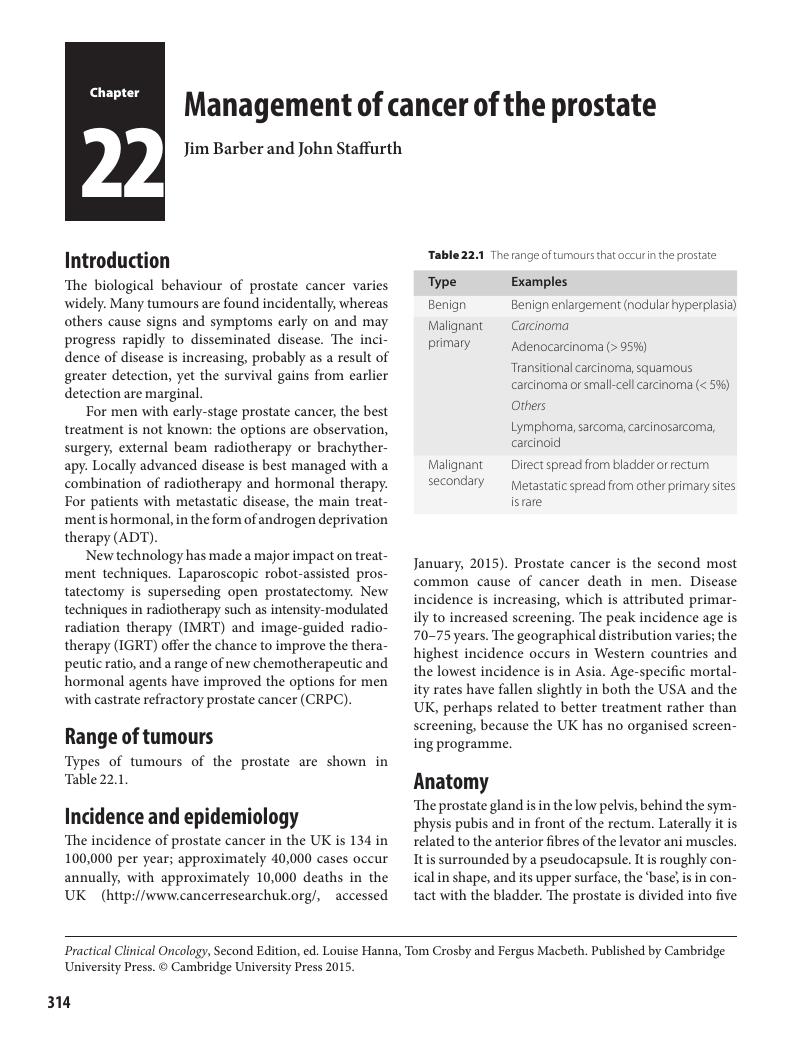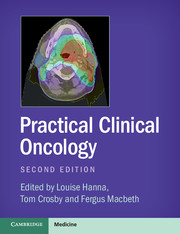Book contents
- Frontmatter
- Contents
- List of contributors
- Preface to the first edition
- Preface to the second edition
- Acknowledgements
- Abbreviations
- 1 Practical issues in the use of systemic anti-cancer therapy drugs
- 2 Biological treatments in cancer
- 3 Hormones in cancer
- 4 Pathology in cancer
- 5 Radiotherapy planning 1: fundamentals of external beam and brachytherapy
- 6 Radiotherapy planning 2: advanced external beam radiotherapy techniques
- 7 Research in cancer
- 8 Acute oncology 1: oncological emergencies
- 9 Acute oncology 2: cancer of unknown primary
- 10 Palliative|care
- 11 Management of cancer of the head and neck
- 12 Management of cancer of the oesophagus
- 13 Management of cancer of the stomach
- 14 Management of cancer of the liver, gallbladder and biliary tract
- 15 Management of cancer of the exocrine pancreas
- 16 Management of cancer of the colon and rectum
- 17 Management of cancer of the anus
- 18 Management of gastrointestinal stromal tumours
- 19 Management of cancer of the breast
- 20 Management of cancer of the kidney
- 21 Management of cancer of the bladder
- 22 Management of cancer of the prostate
- 23 Management of cancer of the testis
- 24 Management of cancer of the penis
- 25 Management of cancer of the ovary
- 26 Management of cancer of the body of the uterus
- 27 Management of cancer of the cervix
- 28 Management of cancer of the vagina
- 29 Management of cancer of the vulva
- 30 Management of gestational trophoblast tumours
- 31 Management of cancer of the lung
- 32 Management of mesothelioma
- 33 Management of soft tissue and bone tumours in adults
- 34 Management of the lymphomas and myeloma
- 35 Management of cancers of the central nervous system
- 36 Management of skin cancer other than melanoma
- 37 Management of melanoma
- 38 Management of cancer of the thyroid
- 39 Management of neuroendocrine tumours
- 40 Management of cancer in children
- Multiple choice questions
- Multiple choice answers
- Index
- References
22 - Management of cancer of the prostate
Published online by Cambridge University Press: 05 November 2015
- Frontmatter
- Contents
- List of contributors
- Preface to the first edition
- Preface to the second edition
- Acknowledgements
- Abbreviations
- 1 Practical issues in the use of systemic anti-cancer therapy drugs
- 2 Biological treatments in cancer
- 3 Hormones in cancer
- 4 Pathology in cancer
- 5 Radiotherapy planning 1: fundamentals of external beam and brachytherapy
- 6 Radiotherapy planning 2: advanced external beam radiotherapy techniques
- 7 Research in cancer
- 8 Acute oncology 1: oncological emergencies
- 9 Acute oncology 2: cancer of unknown primary
- 10 Palliative|care
- 11 Management of cancer of the head and neck
- 12 Management of cancer of the oesophagus
- 13 Management of cancer of the stomach
- 14 Management of cancer of the liver, gallbladder and biliary tract
- 15 Management of cancer of the exocrine pancreas
- 16 Management of cancer of the colon and rectum
- 17 Management of cancer of the anus
- 18 Management of gastrointestinal stromal tumours
- 19 Management of cancer of the breast
- 20 Management of cancer of the kidney
- 21 Management of cancer of the bladder
- 22 Management of cancer of the prostate
- 23 Management of cancer of the testis
- 24 Management of cancer of the penis
- 25 Management of cancer of the ovary
- 26 Management of cancer of the body of the uterus
- 27 Management of cancer of the cervix
- 28 Management of cancer of the vagina
- 29 Management of cancer of the vulva
- 30 Management of gestational trophoblast tumours
- 31 Management of cancer of the lung
- 32 Management of mesothelioma
- 33 Management of soft tissue and bone tumours in adults
- 34 Management of the lymphomas and myeloma
- 35 Management of cancers of the central nervous system
- 36 Management of skin cancer other than melanoma
- 37 Management of melanoma
- 38 Management of cancer of the thyroid
- 39 Management of neuroendocrine tumours
- 40 Management of cancer in children
- Multiple choice questions
- Multiple choice answers
- Index
- References
Summary

- Type
- Chapter
- Information
- Practical Clinical Oncology , pp. 314 - 326Publisher: Cambridge University PressPrint publication year: 2015

